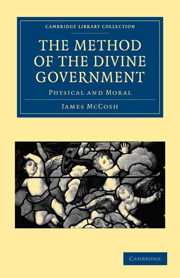Book contents
- Frontmatter
- Contents
- PREFACE TO FIRST EDITION
- PREFACE TO SECOND EDITION
- BOOK FIRST GENERAL VIEW OF THE DIVINE GOVERNMENT AS FITTED TO THROW LIGHT ON THE CHARACTER OF GOD
- CHAPTER I INTRODUCTION
- CHAPTER II GENERAL ASPECT OF THE DIVINE GOVERNMENT; PHENOMENA PRESENTED BY THE PROVIDENCE OF GOD, AND THE CONSCIENCE OF MAN, THOUGH COMMONLY OVERLOOKED
- CHAPTER III THE ACTUAL WORLD, AND THE VIEW WHICH IT GIVES OF ITS GOVERNOR
- BOOK SECOND PARTICULAR INQUIRY INTO THE METHOD OF THE DIVINE GOVERNMENT IN THE PHYSICAL WORLD
- BOOK THIRD PARTICULAR INQUIRY INTO THE PRINCIPLES OF THE HUMAN MIND THROUGH WHICH GOD GOVERNS MANKIND
- BOOK FOURTH RESULTS—THE RECONCILIATION OF GOD AND MAN
- APPENDIX ON FUNDAMENTAL PRINCIPLES
- REFERENCES TO AUTHORS AND SYSTEMS
CHAPTER II - GENERAL ASPECT OF THE DIVINE GOVERNMENT; PHENOMENA PRESENTED BY THE PROVIDENCE OF GOD, AND THE CONSCIENCE OF MAN, THOUGH COMMONLY OVERLOOKED
Published online by Cambridge University Press: 29 August 2010
- Frontmatter
- Contents
- PREFACE TO FIRST EDITION
- PREFACE TO SECOND EDITION
- BOOK FIRST GENERAL VIEW OF THE DIVINE GOVERNMENT AS FITTED TO THROW LIGHT ON THE CHARACTER OF GOD
- CHAPTER I INTRODUCTION
- CHAPTER II GENERAL ASPECT OF THE DIVINE GOVERNMENT; PHENOMENA PRESENTED BY THE PROVIDENCE OF GOD, AND THE CONSCIENCE OF MAN, THOUGH COMMONLY OVERLOOKED
- CHAPTER III THE ACTUAL WORLD, AND THE VIEW WHICH IT GIVES OF ITS GOVERNOR
- BOOK SECOND PARTICULAR INQUIRY INTO THE METHOD OF THE DIVINE GOVERNMENT IN THE PHYSICAL WORLD
- BOOK THIRD PARTICULAR INQUIRY INTO THE PRINCIPLES OF THE HUMAN MIND THROUGH WHICH GOD GOVERNS MANKIND
- BOOK FOURTH RESULTS—THE RECONCILIATION OF GOD AND MAN
- APPENDIX ON FUNDAMENTAL PRINCIPLES
- REFERENCES TO AUTHORS AND SYSTEMS
Summary
SECT. I.—INSTRUCTIVE VIEWS OF GOD PRESENTED BY HIS GOVERNMENT.
An inhabitant of a distant part of our world or of another world, let us suppose, visits Europe, and inspects some of our finer cathedrals, such as that of York or Cologne. Admiring the buildings, he is led to inquire narrowly into their architecture, and he observes how stone is fitted to stone, and buttress to that which it supports, and how all the parts are in beautiful adaptation one to another. Does he know all about these cathedrals, when he has completed this class of observations? In one sense, he knows every thing; he knows that the building material of the one is a species of limestone, and of the other, basalt; every stone and pillar and window has been examined by him, and he has admired the beautiful proportions of the whole fabric. But if he has gone no farther in his inquiries, he has but a meagre idea after all of these temples. There are higher questions, What is the use of this chapter-house; of this crypt; of this lovely chapel or chancel? The stranger has no proper idea of the cathedrals, till rising beyond the minute inspection of stones, and columns, and aisles, he contemplates the grand results and uses, and observes, how this part was for the burial of the distinguished dead—this other part for the kneeling of the worshippers—this third part for the convocation of the priests—this fourth part for the dispensation of the holiest rite of the Christian Church—and the whole for the worship of God.
- Type
- Chapter
- Information
- The Method of the Divine GovernmentPhysical and Moral, pp. 26 - 60Publisher: Cambridge University PressPrint publication year: 2009First published in: 1850



